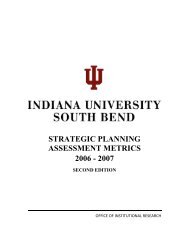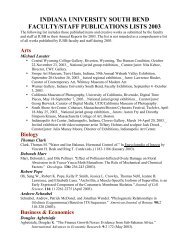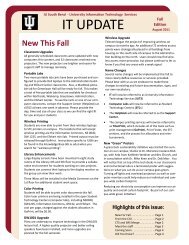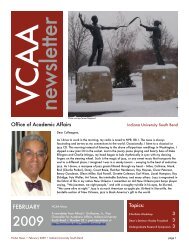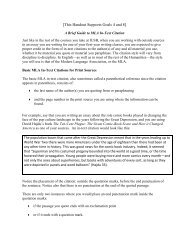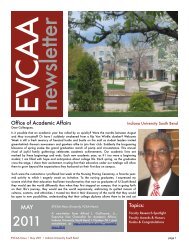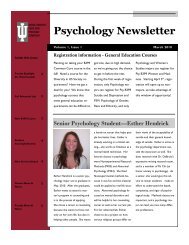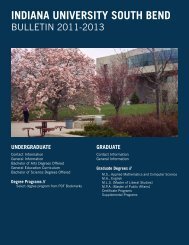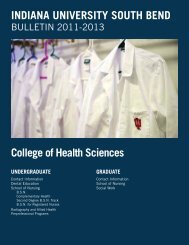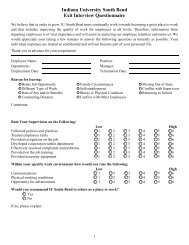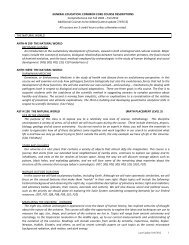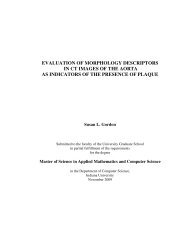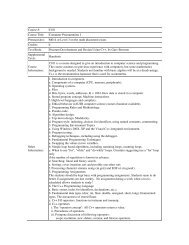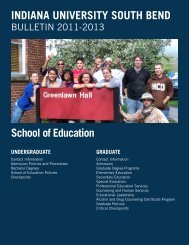Current version - Indiana University South Bend
Current version - Indiana University South Bend
Current version - Indiana University South Bend
You also want an ePaper? Increase the reach of your titles
YUMPU automatically turns print PDFs into web optimized ePapers that Google loves.
LABOR STUDIES PROGRAM 4155<br />
SAC credit is of two types:<br />
• Course-specific credit hours are granted where the<br />
applicant’s competency is substantially equivalent<br />
to the competency that is expected in an <strong>Indiana</strong><br />
<strong>University</strong> course. Credit hours for the specific course<br />
is awarded.<br />
• General credit hours are granted for competencies<br />
that are not the full equivalent of individual courses<br />
but are nevertheless the equivalent of college learning.<br />
This is the only form of SAC credit hours available<br />
outside of the Labor Studies Program.<br />
In general, the following procedures and limitations<br />
govern the award of credit hours for SAC:<br />
• A student must be admitted to the Labor Studies<br />
Program and be in good standing before any credit for<br />
SAC is awarded.<br />
• A maximum of 15 credit hours of SAC credit may be<br />
applied to the Associate of Science in Labor Studies<br />
and a maximum of 30 credit hours to the Bachelor of<br />
Science in Labor Studies.<br />
How To Apply for Self-Acquired<br />
Competencies<br />
The process of building the SAC portfolio is time<br />
consuming. It begins with the development of a resume<br />
and the listing of experiences that may have led to<br />
college-level competencies. The competencies are then<br />
organized and phrased to demonstrate the connection<br />
to specific Labor Studies courses or to general areas<br />
of knowledge in Labor Studies. Finally, appropriate<br />
documentation is added.<br />
Each portfolio is evaluated by two members of the Labor<br />
Studies Program faculty, who also conduct an interview<br />
with the applicant.<br />
Supplementary materials and counseling are available<br />
from Labor Studies faculty on campuses offering the<br />
program.<br />
Transfer of Self-Acquired Competencies<br />
Credit within the <strong>Indiana</strong> <strong>University</strong><br />
System<br />
Self-Acquired Competencies credit awarded by the<br />
faculty of one <strong>Indiana</strong> <strong>University</strong> campus is recorded<br />
and explained on the student’s permanent record. Such<br />
credit will be honored on any other <strong>Indiana</strong> <strong>University</strong><br />
campus to which the student may transfer in order to<br />
complete the associate or bachelor’s degree in Labor<br />
Studies. The student should be aware that such credit<br />
will not necessarily be honored by other degree programs<br />
of <strong>Indiana</strong> <strong>University</strong> or by other institutions.<br />
Academic Policies<br />
Institutional academic policies are stated in the front<br />
section of this publication. All these policies pertain<br />
to students enrolled in Labor Studies; however, the<br />
following policies are particularly relevant.<br />
Academic Forgiveness Policy for Former<br />
<strong>Indiana</strong> <strong>University</strong> Students<br />
Students with academic deficiencies (cumulative grade<br />
point average below 2.0 or C average) in course work done<br />
within the <strong>Indiana</strong> <strong>University</strong> system may be admitted<br />
to the Labor Studies Program on probation. The student<br />
must achieve a 2.0 grade point average for all courses<br />
taken at <strong>Indiana</strong> <strong>University</strong> before and after admission<br />
to the program in order to obtain a degree. Students who<br />
have been dismissed from another academic program<br />
of <strong>Indiana</strong> <strong>University</strong> may not be admitted to the Labor<br />
Studies Program until at least one calendar year has<br />
passed from the date of dismissal.<br />
A student prevented from attaining a cumulative 2.0<br />
grade point average because of poor work in a semester<br />
at <strong>Indiana</strong> <strong>University</strong> that was completed five or more<br />
years before enrollment in the Labor Studies Program<br />
may request the removal of the poor semester from<br />
the Labor Studies Program records. In general, such a<br />
request is granted automatically, particularly in those<br />
cases where the student would be prevented from<br />
graduating because of the one poor semester. All credit<br />
earned during this one semester is also removed from<br />
the grade point average by the Labor Studies Program<br />
under this forgiveness policy.<br />
A similar request may be made for the forgiveness of a<br />
poor semester completed at <strong>Indiana</strong> <strong>University</strong> within five<br />
years prior to admission to the Labor Studies Program.<br />
Approval of such requests is usually dependent, however,<br />
upon the successful completion of 12 credit hours in the<br />
Labor Studies Program. Because all credit earned during<br />
the forgiven semester is removed from the grade point<br />
average, students are encouraged to consult with their<br />
advisor concerning the advisability of this procedure.<br />
This policy is designed to avoid placing an excessive<br />
burden on students who, in the past, have made a poor<br />
start at <strong>Indiana</strong> <strong>University</strong>. It is not intended to permit<br />
students with chronically poor performance in the<br />
university to stay in school, nor to raise false hopes for<br />
students who are not making progress toward a degree.<br />
Academic Forgiveness Policy for Students<br />
Dismissed from Other Institutions<br />
Students who have been dismissed from another<br />
postsecondary institution may not be admitted to the Labor<br />
Studies Program until at least one calendar year has passed<br />
since the date of the dismissal.<br />
<strong>University</strong> regulations require that the admissions office<br />
indicate any deficiencies in grade point average (average<br />
grade below 2.0 on a 4.0 scale) at another institution<br />
on the credit transfer report. The policy is to maintain a<br />
student’s grade point average based only on work done at



